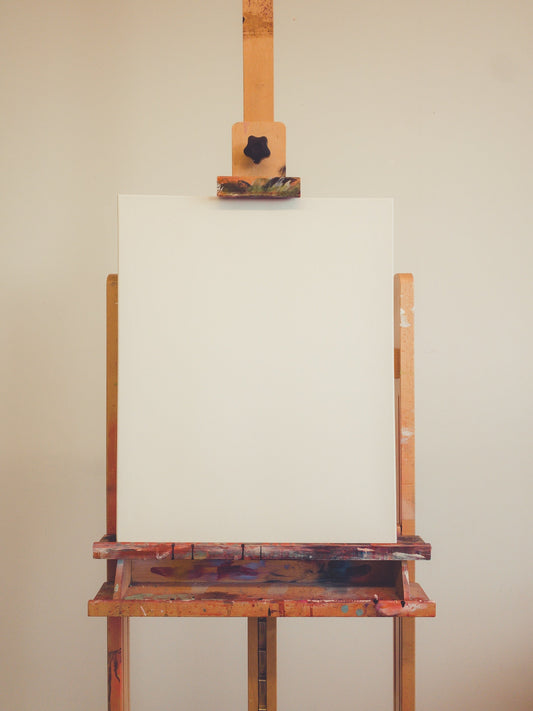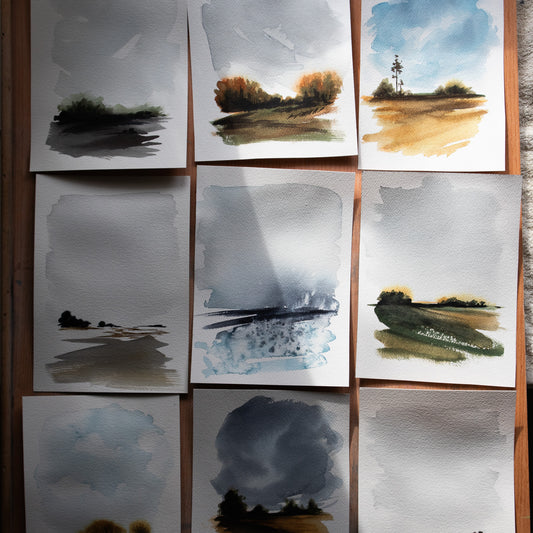The curse of the multi-passionate creative
I used to write long, peppy articles about the "secret superpower of being multi-passionate". On how "we're all misunderstood, underutilized, and discriminated against by society, and that all we need to do is turn our weaknesses into strengths and voila - the world is ours".
Well, I'm approaching forty and the relentless optimism of my 20s and early 30s has been replaced by a more sensible kind of realism. Do I still believe that having many passions and skills is a strength? Yes. Does that mean we multi-passionates are misunderstood geniuses? No.
It's time for a more nuanced discussion of what it means to be a multi-passionate creative today: the good and the bad, the problems and the solutions.
First off, let's get our definitions straight. We may think of different things when we hear the words "polymath", "multi-passionate" or "renaissance person". What they mean is basically just a person who has knowledge and experience in a wide array of fields. But where do we draw the line?
Most human beings do have more than one interest or talent in life. Most of us are curious, especially if we have a creative brain. We might have tried out a bunch of different odd jobs or hobbies. We might have switched careers at some point, or gone back to school. All perfectly normal, especially nowadays when it's much easier to learn new skills and increasingly rare to work for the same company your whole adult life. We're all polymaths to some degree. We contain multitudes, and increasingly so the older we get.
But what I want to talk about here is that feeling of being almost equally passionate about and/or talented in two or more creative disciplines. And really struggling with choosing one as a career choice. Or juggling them all at the same time. And changing your mind a lot. And feeling like a hopeless loser and like you're never really getting anywhere. Being a "jack of all trades and master of none".
This is the experience that I've had most of my life, and that I know a lot of other creatives have as well. We never found our "one thing". Our path was never clear. And we've been forever haunted by the advice to "follow our passion". Well... which one?
About a decade or so ago, I got one of the biggest revelations of my life when I stumbled over an article online called "Are you a scanner?", by writer Barbara Sher. The article began by lining up a series of statements:
"I can never stick to anything."
"I keep changing my mind about what I want to do and end up doing nothing."
"I won't choose a career path because it might be the wrong one."
I related to all of these too well. I was working part-time in a reception area at the time, while simultaneously running a blog, taking a few college courses, and building two businesses on the side.
The article continued:
"If you've ever said these things to yourself, chances are good that you're a Scanner, a very special kind of thinker. You are the owner of a remarkable, multi-talented brain trying to do its work in a world that doesn't understand who you are and doesn't know why you behave as you do."
This all sounds very over-the-top self-helpy to me now. But at the time, it hit me like a punch in the gut. Scanner. That was a new word for me. I'd heard of renaissance people and polymaths, but that never felt like me. I wasn't some prolific genius. I was just a dabbler. Name anything and I'd had a phase of it: Rap music, acting, online poker, programming, game development, knitting, gardening. And where had it gotten me? Precisely nowhere.
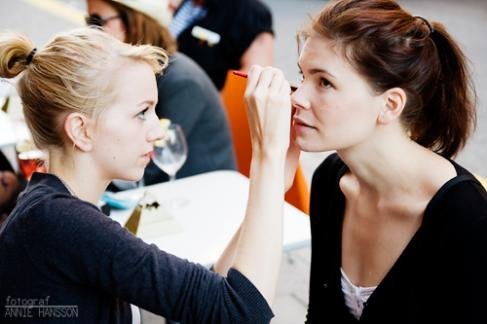
Me, in 2010, on the set of web series, getting my makeup done.
I had started to believe something was seriously wrong with me. And what do we need most when we feel like that? A word for what we are.
Something about the way Sher described this Scanner-person resonated with me. She used the analogy of the honey bee: A bee flies from flower to flower, collecting nectar. Nobody would accuse a bee of being scattered or unfocused or getting bored too easily. A honey bee isn’t passionate about any particular flower, they’re passionate about the process of collecting nectar. "Switching flowers is part of the plan", Sher writes.
Being a scanner means being chronically curious about everything. You're "scanning the horizon", rather than diving deep into anything. You're easily inspired, easily enthused, but also easily bored. You'll completely devour a topic and as soon as you feel like you get the hang of it, you move on to the next thing. You know a little about a lot - you're a great conversationalist at a party. But you feel confused, overwhelmed, and constantly behind in life.
From an evolutionary standpoint, it makes sense to have a mixture of specialists and generalists in the population. It's useful for some members of the community to be extra curious, adaptable, and sort of "all-purpose". It makes the group both less vulnerable and more progressive. Lateral thinking, and combining ideas from different disciplines, have always led to groundbreaking discoveries and inventions. Successful creatives are often generalists. The more widespread our knowledge and experience, the more potential for creative cross-pollination.
So. We need both experts and multi-talented generalists in a well-functioning society and economy. None is better than the other.
But no matter how useful it is to have a curious mind, and be good at a lot of things, it comes at a price. You can't be really good at a lot of things at the same time. You can't be prolific while juggling five different careers. (Unless you're a workaholic, have no family or friends, and are on drugs.) If you're like most of us, you only have 24 hours in a day, and you have to choose wisely what to do with that time. You have to focus and apply yourself to one thing for enough time to start seeing results. That can be hard to do for a multi-passionate person who's itching to switch things up.
The problem is not our personality type though, it's how we build our careers around it. We won't fit into most regular jobs or professions out there, not without feeling bored, miserable, and at a constant disadvantage.
Most traditional careers are for experts and one-trick-ponies. You're hired because of your expertise in an area, and you're expected to do mainly one or a handful of tasks. It's frowned upon to drop out of college or switch careers because a lot of half-finished degrees, odd jobs, and short employments do not look good on a CV. An employer might read that and think "this is a lazy, unreliable, scatter-brained quitter."
This is changing, however. There is an increasing demand for range in a lot of occupations, and a lot more ways to make a living than, say, twenty years ago. The Gig Economy, the ability to work remotely, plus all of the ways to build a business and make a living online... they all allow for more freedom and flexibility in how we approach our careers. Grades and degrees are not as universally important anymore, especially not in fields like business and art. What's more valued is mindset, social skills, and a proven track record or portfolio. Tim Ferriss, a famous author, podcaster, entrepreneur, and investor, has written about the perks of being a jack of all trades for many years, and that holds true today more than ever.
For a restless, multi-passionate creative, this is our time to thrive. At least in theory. It's still not easy in practice. We'll need to design our job ourselves, instead of trying to fit ourselves into pre-existing jobs. And that takes self-reflection, determination and focus.
It can also take a lot of time to figure yourself out and start gaining momentum, at least it has for me. I still have days where I feel like a loser moving at snail-pace, and not having accomplished anything of value in my life. But all these years spent dabbling - learning a skill here and there, building businesses and abandoning them, freelancing and consulting - have started to add up. On a resume, they still look like wildly separate things. But in this new world of internet lifestyle businesses, they make total sense.
What does a modern-day creative business person do, if not many different jobs at once:
- Writing, and/or
- Audio production, and/or
- Video production
- Photography and graphic design
- Web development and web design
- PR and marketing
- Business planning, and organization
- Social media management
- Sales
- Accounting (however reluctantly)
Most people who run creative businesses, blogs, podcasts, and YouTube channels today have had to learn the basics of many or all of these fields, and even become great at them. (Because most one-person-businesses don't want to, or can't afford to, hire people.) Which is another reason why multi-talented, easily-bored creatives have a natural advantage as entrepreneurs.
Again - in theory.
Because even if we theoretically have all the opportunities in the world, the enemy lies within. We are our own worst saboteurs and critics. Our biggest problem is not prejudice, or the job market, or "being misunderstood". It's understanding ourselves and putting our many talents to work in a productive way.
So how do we do that, then? How do we choose what to focus on, how do we finish things and not just start them, how do we make progress?
I don't know. I'm still figuring it out. 😂
If you'd asked me years ago, I would have had a printable pdf for you with questions, journal prompts, and equations. (I'm not even joking, I did have such a pdf.) But I'm getting older, and slowly but surely realizing how little I know. And how unfit I am to lead anyone anywhere.
I can tell you what has worked for me though.
1. Being self-taught
And with that, I mean getting good at teaching myself stuff. Finding out what exactly I need to know, or be able to do, selecting my own teachers and resources, researching and learning online, and practicing systematically and purposefully. Not relying on traditional education: Sitting around for months, anxiously waiting to see if I would get "accepted". (If I was even allowed to apply in the first place.) Paying an unreasonable amount of money and spending an unreasonably long time studying, in the manner someone else has decided I should study, while being judged and graded according to arbitrary rules, with no regard for my particular goals. And then realizing that no one actually cares about my diploma anyways, they just want to see my portfolio.
We're talking about creative professions right now, not fields where formal education is a must, like for doctors and scientists. Most of the stuff taught in art- or business school, we can learn just as well on our own by reading a few books, practicing the skills, and actually doing the work. And we can do that for free, right now. In this instance, Google really is your friend. (Regardless of what you think about the company.)
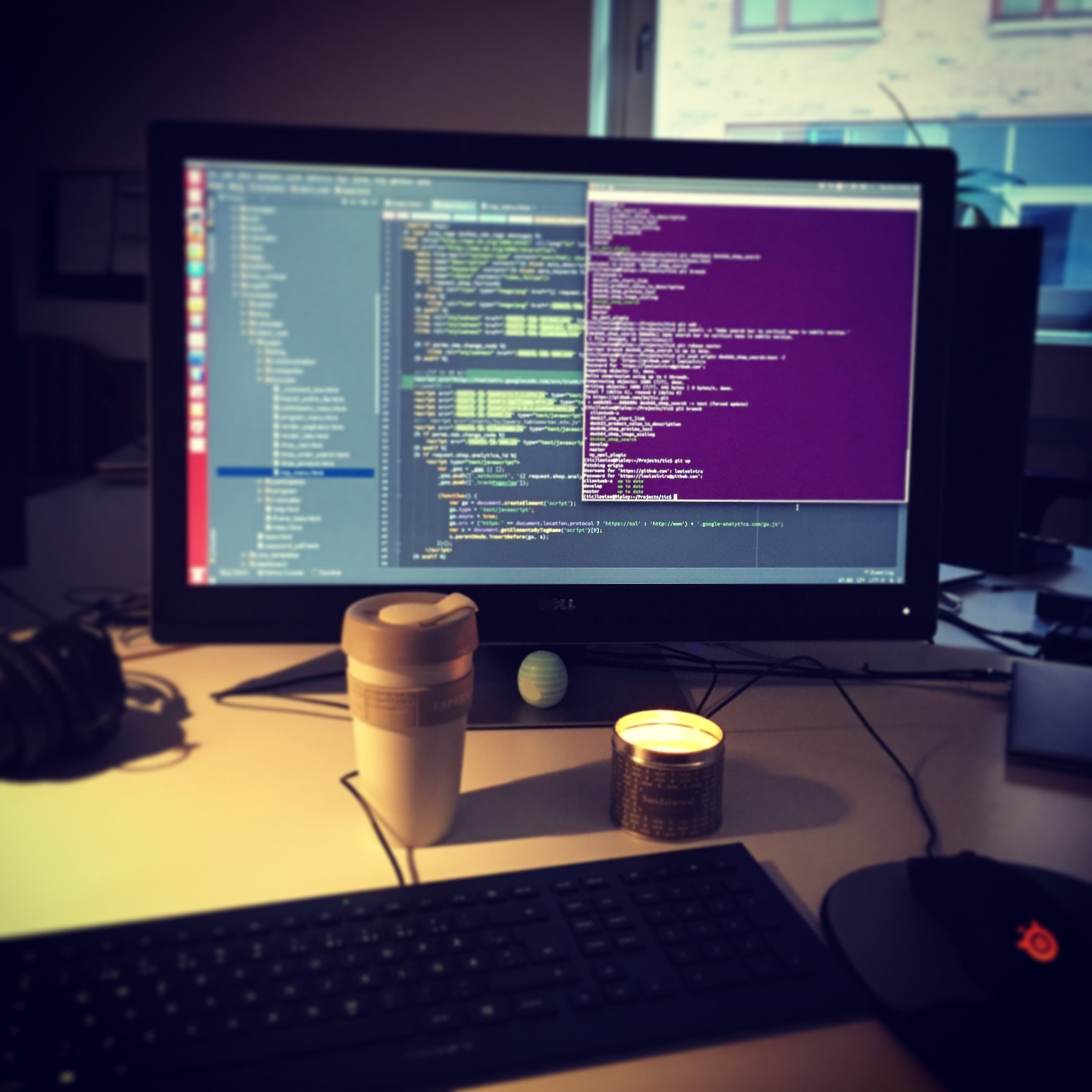
My brief but happy employment as a programmer. A skill I taught myself for free, online.
2. Thinking in projects, not jobs or careers
I've always made the mistake of thinking everything I do has to be a commitment for life. Now I try to instead commit to smaller experiments, sprints, and projects.
When I started out as an indie author a few years ago, my first "sprint" was writing and releasing some short stories and novellas online. I didn't start out writing an epic series of novels, I just wanted to take the first small steps. I knew I was probably going to lose steam after a while anyways, and want to do something else. And instead of having a half-written novel on my computer that no one would see, I could have a few stories out there in the world, gathering readers and reviews.
It was the same with my YouTube channel. I knew I probably wouldn't want to be a YouTuber for life, or even make art professionally, full-time, for the rest of my life. But it was what excited me at the time, and I knew that every video I made would sit there gathering views and subscribers for many years afterward. My work wouldn't be lost.
The biggest mistake I've made throughout my career is not juggling too many things at once, or even quitting, but shutting down or hiding my previous work. Why did I do that? Because it cost too much money to have lots of websites and email lists running at the same time. And because it didn't fit my current persona or whatever new thing I wanted to do. I've felt like I could only show one version of myself at a time, and so I've divided myself and my different passions into separate silos, and never the twain shall meet. This has led to a lot of lost work and progress that I wish I could have kept and maintained.
Think of every new project as planting a seed for a tree. It might need a little initial effort, but then it will grow with or without your involvement. You don't need to feel guilty for not tending to the tree all the time. You can have periods where you actively grow the tree by watering, fertilizing, pruning, and weeding. And other periods where you just let it grow on its own. But the tree's going to grow regardless, unless you cut it down.
Just get the tree/project going, work with it in sprints, and avoid taking it down. That's my current method for how to be multi-passionate and still get somewhere, slowly but surely.
3. Being my own boss
Are there jobs and employments suitable for multi-passionate creatives? Sure. I've had a few of them. But I quickly realized that the more I insisted on working for other people, the more stuck I would be in a perpetual cycle of starting from scratch, building up steam, disappointing everyone and myself, quitting, and then starting from scratch again someplace else. This was what my early years on the job market looked like. Me, frantically running around, trying to fit my various skills and interests into ill-fitting professions that just ended up boring me or burning me out after six months. Because I just couldn't stand the thought of doing the same thing every day, at the same desk, with the same co-workers, for years and years.
As a freelancer/entrepreneur/self-employed person, I was free to work when and where I wanted, on whatever I wanted, and however I wanted. I could do several things simultaneously. I could collaborate with others, or not. I could have multiple income streams, active and passive. I could make use of all the skills I'd acquired, while also building new skills.
One of the first ways I managed to thrive in my career was as a freelance writer. I realized, thanks to a freelance journalist blogger I discovered, that there was no barrier to entry to write for magazines. If you could write, and you had an idea for an article, you could just pitch it to editors. And if they liked it, they would buy it.
I tried it out for myself, and it worked. Some magazine editors wanted to pay me for writing for them. They didn't ask to see if I had a journalism degree (I didn't.) They didn't even care about my resume.
As a freelance writer, I was free to delve deep into any topic that interested me at the time, pitch an article about it, and get paid writing for it. Without having to be an expert at anything, and without having to pick a niche. I really felt like the proverbial honey bee, flying from flower to flower. It was a joyful time.
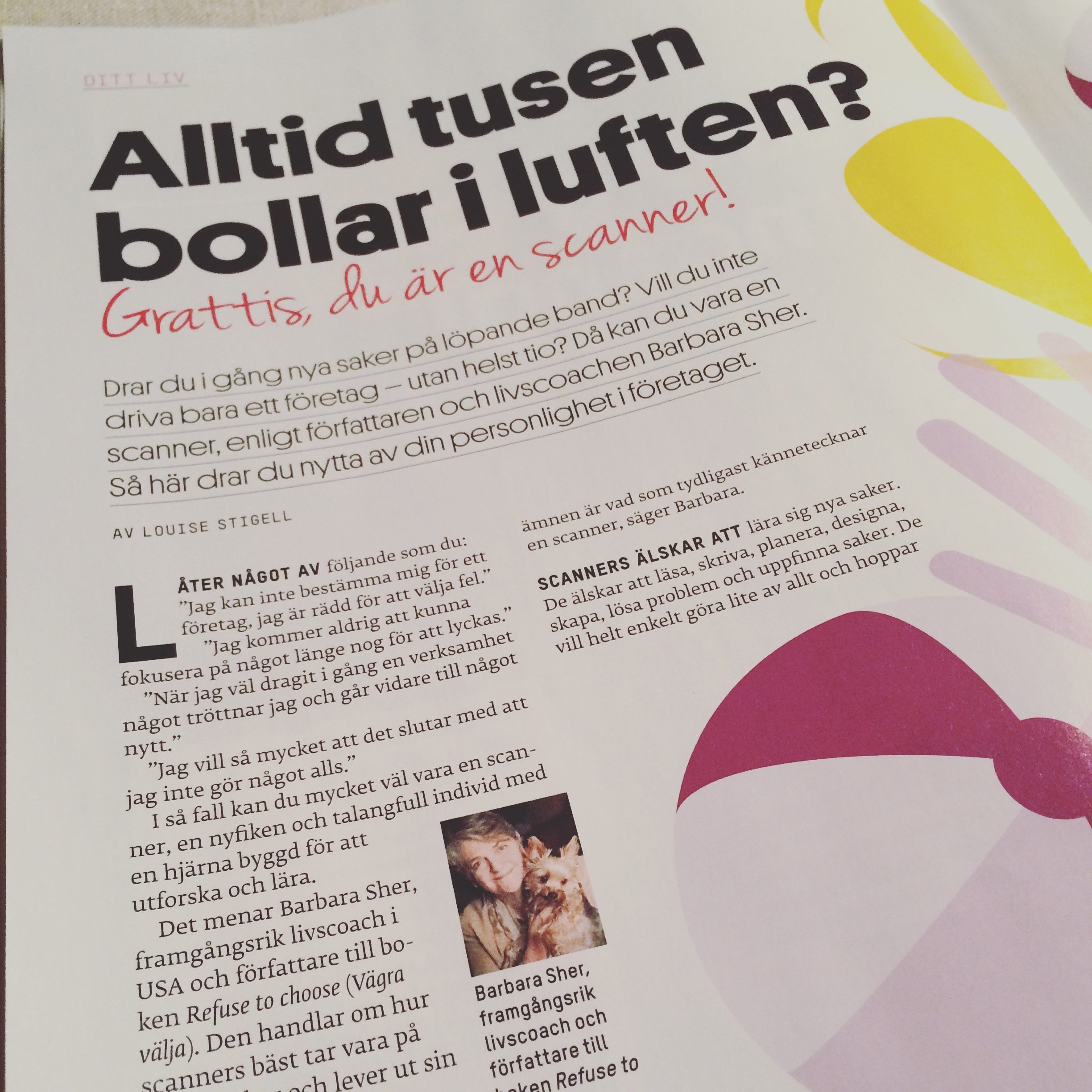
I even wrote a magazine article about being a Scanner. (In Swedish)
There are many similar professions like this, more today than ever. But most of them require you to be your own boss. Learning about marketing, audience building, and sales. I could have never made a living just sitting alone in my chamber, practicing my art. I've also had to make websites to show my art, create content around my art to let people know I exist, write sales copy so that people would want to buy my art, and so on.
Being your own boss means stress and economic uncertainty. But also freedom. Sweet, sweetfreedom.
As an entrepreneur, being multi-passionate has a compounding effect. The more stuff I've tried, projects I've done, and skills I've built, the easier it's become to start new things. I've studied web development, which has allowed me to take a job as a web developer, freelance as a web designer, teach an online course in web design, and save money by making my own websites for other projects. I've learned video editing while running my YouTube channel, which means I can freelance at that if I want to, I can teach the skill to others, and I can use the knowledge to create better courses to teach my other skills. Synergies and overlap everywhere.
All of the skills and passions and personal experiences you have accumulated throughout your life are valuable assets. Even if you're not using them right now. Even if you don't know what to do with them, yet.
It can feel like a curse to be passionate about a lot of stuff, feeling pulled in all directions, confused, and frustrated. Some of that will probably always haunt us. But the rest of it, we just need to take responsibility for. Find ways to work with and not against ourselves. Lower our expectations of ourselves. Stop comparing ourselves to specialists who have done one thing and one thing only since they were 16.
Let's also remember that we don't have to make a career out of everything. Making a living on something we love can sometimes lead to us not loving that thing anymore. I've always wanted to be a career-creative, which is my cross to bear. But you might not want, or need, to make a living on your passion(s). Which effectively neutralizes the curse. Having too many options is only a problem if we have to choose.
Getting to do what we love, in any way or capacity, is a gift. Let's celebrate that, instead of feeling guilt or self-hatred for our many unfinished projects, or for not having gotten as far as we think we should in life. That's not what life is about, anyways. We're not here to hustle, become famous, or win some game. We have absolutely zero obligation to "make something of ourselves", whatever that means.
Success can look a lot of different ways. For me, right now, it just means: Let me paint. Let me write. Let me be myself and do my thing. And let me make just enough money to get by. I don't need to be an expert at anything or a prolific genius. I don't need to win awards.
For a creative, getting to create is the real reward. And as multi-passionate, multi-talented creatives, we have more ways to do that than anyone else. We have already won.
Being a honey bee can be a lovely existence.

